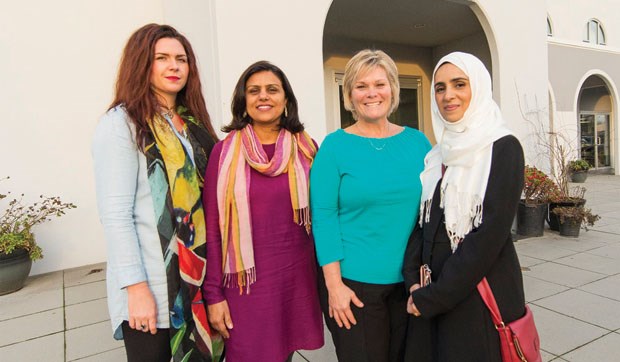A Delta mosque is reaching beyond its own teachings to seek answers as to whether religion promotes extremism and violence.
Last month, the Ahmadiyya Muslim Community Women’s Auxiliary invited Christians, Jews, Hindus, Sikhs and other religious followers to a women-only symposium to answer the question, “Does Religion Promote Extremism?”
Moderated by Delta Coun. Sylvia Bishop, speakers were invited from several religions, including Rabbi Susan Shamash (Judaism), Pastor Jennifer Wilson (Christianity), Nishtha Nuckchady (Hinduism), Sundeep Kaur (Sikhism) and Naheed Chokher (Islam). On hand as well was Delta Mayor Lois Jackson, Surrey-Panorama MLA Jinny Sims, Delta police Sgt. Cathy Geddes and Church of Jesus Christ of Latter-day Saints B.C. public affairs council co-director Tonya Engen.
“Every religion, at some point in time, has been accused of spreading, promoting or teaching violence,” said Aaisha Mahmood, a member of the auxiliary. “But is it really the teachings of that religion to be blamed?”
Mahmood said right now it’s clear that her religion of Islam is “under fire” due to constant media reports of terrorism and wars in Muslim countries. Because of that violence, she and other Muslims say they have experienced hostility from non-Muslims in Canada.
“It makes you afraid for your safety and the safety of your loved ones. Your future seems uncertain.”
The symposium comes on the heels of an ugly incident on a Vancouver SkyTrain last month in which a Muslim teenager was accosted by a stranger. Noor Fadel, an 18-year-old Iraqi immigrant, was allegedly threatened by a stranger uttering obscenities at her because of her hijab. When a fellow passenger, Jake Taylor, saw what was happening, he put himself between Fadel and her assailant to prevent any further problems.
Mahmood says that while fear can be created by a lack of understanding, it can just as easily be eliminated by talking to other people. She said every religion has the same teachings with respect to how adherents should treat their fellow human beings, and Islam is no exception.
“You should tell the truth, you should not kill, you should respect others, you should take care of the weak,” she said. “[Faith] creates emotionally secure people and then you don’t hurt others. You become a positive part of society.”
Beyond the big questions about God and mankind, Mahmood said the interfaith symposium was also an opportunity for people of other religions and cultures to see firsthand what it’s like to go inside a mosque. Until she came to Canada three years ago, that curiosity was something she grew up with in Pakistan.
“I always wanted to go inside a Hindu temple or a church and see how people pray,” she said.
The Ahmadiyya Muslim Community Women’s Auxiliary has held an interfaith symposium every year since 2014, with last year’s event inviting guests to speak about their religion’s founders.



